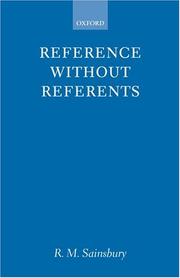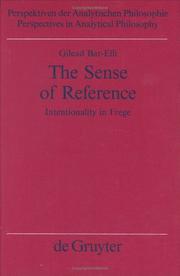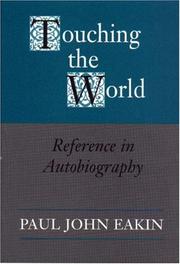| Listing 1 - 10 of 23 | << page >> |
Sort by
|
Book
ISBN: 9587840151 9789587840155 Year: 2018 Publisher: Bogotá, Colombia : Editorial Universidad del Rosario :; Ciudad de Mexico Universidad Autónoma Metropolitana, Unidad Cuajimalpa,
Abstract | Keywords | Export | Availability | Bookmark
 Loading...
Loading...Choose an application
- Reference Manager
- EndNote
- RefWorks (Direct export to RefWorks)
Reference (Philosophy) --- Russell, Bertrand, --- Frege, Gottlob,
Book
ISBN: 1283953145 0262306034 0262305119 9780262306034 9780262018302 0262018306 9780262305112 9781283953146 Year: 2012 Publisher: Cambridge, Mass. : MIT Press,
Abstract | Keywords | Export | Availability | Bookmark
 Loading...
Loading...Choose an application
- Reference Manager
- EndNote
- RefWorks (Direct export to RefWorks)
Original essays on reference and referring by leading scholars that combine breadth of coverage with thematic unity. These fifteen original essays address the core semantic concepts of reference and referring from both philosophical and linguistic perspectives. After an introductory essay that casts current trends in reference and referring in terms of an ongoing dialogue between Fregean and Russellian approaches, the book addresses specific topics, balancing breadth of coverage with thematic unity.The contributors, all leading or emerging scholars, address trenchant neo-Fregean challenges to the direct reference position; consider what positive claims can be made about the mechanism of reference; address the role of a theory of reference within broader theoretical context; and investigate other kinds of linguistic expressions used in referring activities that may themselves be referring expressions.The topical unity and accessibility of the essays, the stage-setting introductory essay, and the comprehensive index combine to make Reference and Referring, along with the other books in the Topics in Contemporary Philosophy series, appropriate for use in advanced undergraduate and graduate courses.

ISBN: 0199241805 9780199241804 9780199230402 0199230404 0191602698 9786611190552 1281190551 0191529222 1435622006 9780191529221 9780191602696 Year: 2005 Publisher: Oxford ; New York : Clarendon Press,
Abstract | Keywords | Export | Availability | Bookmark
 Loading...
Loading...Choose an application
- Reference Manager
- EndNote
- RefWorks (Direct export to RefWorks)
Reference is a central topic in philosophy of language. This book sets out a new approach to the concept, which promises to bring to an end some long-standing debates in semantic theory. It also includes an historical survey. It will be of interest to those working in logic, mind, and metaphysics.
Philosophy of language --- Language and languages --- Reference (Philosophy) --- Philosophy. --- Reference (Philosophy). --- Referring, Theory of --- Theory of referring --- Philosophy --- Référence (philosophie) --- Référence (philosophie)
Book
ISBN: 9780199928385 019992838X 0199332959 0190208058 0199928398 9780199928392 129960059X 9781299600591 9780190208059 Year: 2013 Publisher: New York : Oxford University Press,
Abstract | Keywords | Export | Availability | Bookmark
 Loading...
Loading...Choose an application
- Reference Manager
- EndNote
- RefWorks (Direct export to RefWorks)
Saul Kripke's 'Locke Lectures' were delivered in Oxford in 1973. Delivered in Kripke's usual extemporaneous style, for years the lectures have only been available as a transcription that has been informally exchanged among philosophers. This volume, which publishes the lectures, follows up on some of the themes on language that Kripke started to explore in his most famous work 'Naming and Necessity'.
Référence (philosophie) --- Ontologie --- Reference (Philosophy) --- Ontology --- Reference (Philosophy). --- Ontology. --- Philosophy of language --- Metaphysics --- Référence (Philosophie) --- Ontologie. --- Being --- Philosophy --- Necessity (Philosophy) --- Substance (Philosophy) --- Referring, Theory of --- Theory of referring
Book
ISBN: 9780199609208 0199609209 0191745022 1283837293 0191642835 9780191642838 9781283837293 9780191745027 Year: 2013 Publisher: Oxford : Oxford University Press,
Abstract | Keywords | Export | Availability | Bookmark
 Loading...
Loading...Choose an application
- Reference Manager
- EndNote
- RefWorks (Direct export to RefWorks)
Joseph LaPorte offers an original account of the connections between the reference of words for properties and kinds, and theoretical identity statements. He argues that terms for properties, as well as for concrete objects, are rigid designators, and defends the Kripkean tradition of theoretical identities.
Linguistics --- Reference (Philosophy) --- Identity (Philosophical concept) --- Référence (Philosophie) --- Identité --- Référence (Philosophie) --- Identité --- Language and languages --- Philosophy.
Book
ISBN: 1283121131 9786613121134 9004204741 9789004204744 9789004204355 9004204350 9781283121132 6613121134 Year: 2011 Publisher: Boston : Brill,
Abstract | Keywords | Export | Availability | Bookmark
 Loading...
Loading...Choose an application
- Reference Manager
- EndNote
- RefWorks (Direct export to RefWorks)
For a number of centuries Indian philosophers of all persuasions were convinced that there was a particularly close connection between language and reality, also, or even primarily, between sentences and the situations they describe. This shared conviction was responsible for a perceived problem. Different currents in Indian philosophy can be understood as different attempts to solve this problem; these include the satkāryavāda of the Sāṃkhyas, the anekāntavāda of the Jainas, the śūnyavāda of the Buddhists, and many others. By bringing to light the shared problem underlying almost all schools of Indian philosophy, this book shows the interconnectedness of currents that had hitherto been thought of as quite independent of each other.
Language and languages --- Philosophy, Indic --- Reality --- Reference (Philosophy) --- Philosophy --- Truth --- Nominalism --- Pluralism --- Pragmatism --- Referring, Theory of --- Theory of referring --- History.
Book
ISBN: 1282966642 9786612966644 904203159X 9789042031593 9042031581 9789042031586 9781282966642 6612966645 Year: 2010 Publisher: Amsterdam ; New York, N.Y. : Rodopi,
Abstract | Keywords | Export | Availability | Bookmark
 Loading...
Loading...Choose an application
- Reference Manager
- EndNote
- RefWorks (Direct export to RefWorks)
This volume contains a selection of nine essays with an interdisciplinary perspective. They were originally presented at the Sixth International Conference on Word and Music Studies, which was held at Edinburgh University in June 2007 and was organized by the International Association for Word and Music Studies (WMA). The contributions to this volume focus on self-reference in various systematic, historical and intermedial ways. Self-reference – including, as a special case, metareference (the self-conscious reflection on music, literature and other medial concerns) – is explored, among others, in instrumental music by Mozart, Mahler and Satie, in the structure and performance of (meta-)operas, in operatic adaptations of drama and filmic adaptations of opera, as well as in intermedial novelistic references to music. The essays cover a historical range from the 18th century to the present and are of interest to literary and opera scholars and students, musicologists as well as all readers generally interested in medial self-reference and intermediality studies.
Reference (Philosophy) in literature. --- Reference (Philosophy) --- Referring, Theory of --- Theory of referring --- Philosophy --- Self in literature. --- Music --- Themes, motives. --- Art music --- Art music, Western --- Classical music --- Musical compositions --- Musical works --- Serious music --- Western art music --- Western music (Western countries) --- Music and literature --- Reference (Philosophy) in literature --- Philosophy and aesthetics
Book
ISBN: 1283292890 9786613292896 1441697993 9639776920 9781441697998 9789639776920 9781283292894 9789639776869 9639776866 Year: 2011 Publisher: Budapest ; New York : Central European University Press,
Abstract | Keywords | Export | Availability | Bookmark
 Loading...
Loading...Choose an application
- Reference Manager
- EndNote
- RefWorks (Direct export to RefWorks)
The volume presents the material of the first Oxford-Budapest Conference on Truth, Reference and Realism held at CEU in 2005. The problem addressed by the conference, famously formulated by Paul Benacerraf in a paper on Mathematical Truth, was how to understand truth in the semantics of discourses about abstract domains whose objects and properties cannot be observed by sense perception. The papers of the volume focus on this semantic issue in four major fields: logic, mathematics, ethics and the metaphysics of properties in general. Beyond marking an important event, the collected papers are also substantial contributions to the above topic, from the most distinguished authors in these areas.
Realism --- Reference (Philosophy) --- Truth --- Empiricism --- Philosophy --- Universals (Philosophy) --- Conceptualism --- Dualism --- Idealism --- Materialism --- Nominalism --- Positivism --- Rationalism --- Referring, Theory of --- Theory of referring --- Conference, Ethics, Logics, Philosophy.

ISBN: 311015059X 9783110150599 1306275474 3110813033 9783110813036 Year: 1996 Publisher: Berlin ; New York : Walter de Gruyter,
Abstract | Keywords | Export | Availability | Bookmark
 Loading...
Loading...Choose an application
- Reference Manager
- EndNote
- RefWorks (Direct export to RefWorks)
Frege, Gottlob --- Intentionality (Philosophy) --- -Knowledge, Theory of --- -Reference (Philosophy) --- -Referring, Theory of --- Theory of referring --- Philosophy --- Epistemology --- Theory of knowledge --- Psychology --- Act (Philosophy) --- Mind and body --- History --- Knowledge, Theory of --- Reference (Philosophy) --- History. --- -History --- Referring, Theory of --- Frege, Gottlob, --- Frege, G. --- Fu-lei-ko, --- Frege, Friedrich Gottlob, --- פרגה, גוטלוב, --- Frege, Friedrich Ludwig Gottlob, --- Intentionnalité (philosophie) --- Théorie de la connaissance --- Philosophie du langage

ISBN: 0691068208 9786612505683 1400820642 1282505688 1400811430 9781400811434 9780691068206 1400801788 Year: 1992 Publisher: Princeton, N.J. : Princeton University Press,
Abstract | Keywords | Export | Availability | Bookmark
 Loading...
Loading...Choose an application
- Reference Manager
- EndNote
- RefWorks (Direct export to RefWorks)
Paul John Eakin's earlier work Fictions in Autobiography is a key text in autobiography studies. In it he proposed that the self that finds expression in autobiography is in fundamental ways a kind of fictive construct, a fiction articulated in a fiction. In this new book Eakin turns his attention to what he sees as the defining assumption of autobiography: that the story of the self does refer to a world of biographical and historical fact. Here he shows that people write autobiography not in some private realm of the autonomous self but rather in strenuous engagement with the pressures that life in culture entails. In so demonstrating, he offers fresh readings of autobiographies by Roland Barthes, Nathalie Sarraute, William Maxwell, Henry James, Ronald Fraser, Richard Rodriguez, Henry Adams, Patricia Hampl, John Updike, James McConkey, and Lillian Hellman. In the introduction Eakin makes a case for reopening the file on reference in autobiography, and in the first chapter he establishes the complexity of the referential aesthetic of the genre, the intricate interplay of fact and fiction in such texts. In subsequent chapters he explores some of the major contexts of reference in autobiography: the biographical, the social and cultural, the historical, and finally, underlying all the rest, the somatic and temporal dimensions of the lived experience of identity. In his discussion of contemporary theories of the self, Eakin draws especially on cultural anthropology and developmental psychology.
American prose literature --- Authors, American --- Authors, French --- Autobiography. --- French prose literature --- Reference (Philosophy). --- History and criticism. --- Biography --- 82-94 --- 82-94 Dagboek. Memoires. Autobiografie --- Dagboek. Memoires. Autobiografie --- Reference (Philosophy) --- Autobiographies --- Autobiography --- Egodocuments --- Memoirs --- Referring, Theory of --- Theory of referring --- History and criticism --- Technique --- Biography as a literary form --- Philosophy --- French authors --- American authors --- Biography&delete&
| Listing 1 - 10 of 23 | << page >> |
Sort by
|

 Search
Search Feedback
Feedback About UniCat
About UniCat  Help
Help News
News